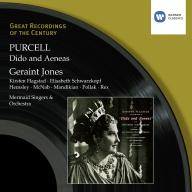In 1941, Flagstad returned to Norway to be with her husband, which led to rumors that she was a Nazi sympathizer. However, the only appearances she made outside of Norway were in Switzerland. Her first major appearances were in London singing Isolde and Brunhilde. She sang four seasons at the Royal Opera, Covent Garden, and then appeared in a fabled production of Purcell's Dido and Aeneas at the Mermaid Theater. She returned to the Metropolitan Opera in 1950 and during her final seasons there sang Brunhilde, Isolde, Fidelio, and the title role in Gluck's Alceste, the role of her farewell. In 1949 and 1950, she appeared in Fidelio at the Salzburg Festival, her only appearances there.
In 1950, she sang the world premiere of the Four Last Songs by Richard Strauss in London under the direction of Wilhelm Furtwängler. Her concert repertoire ranged from the Beethoven Missa Solemnis and Rossini's Stabat mater to songs of Schubert, Brahms, and Mahler. After her retirement, she continued to make recordings, including a highly acclaimed performance of Fricka in the first complete recording of Wagner's Das Rheingold, and in 1958 was named general manager of the new Norwegian National Opera.
The voice of Kirsten Flagstad was a full dramatic soprano with great warmth. Unlike the voice of Birgit Nilsson, which was like a laser beam, Flagstad's voice enveloped the listener in a cushion of sound. She brought her characters to life primarily through vocal means; the overt theatricality of the later 20th century was not part of her dramatic arsenal nor was it seen in any of her colleagues. Her many appearances with Lauritz Melchior at the Metropolitan Opera and at other houses in the 1930s made the music dramas of Wagner the core of the repertoire at these houses., Rovi












